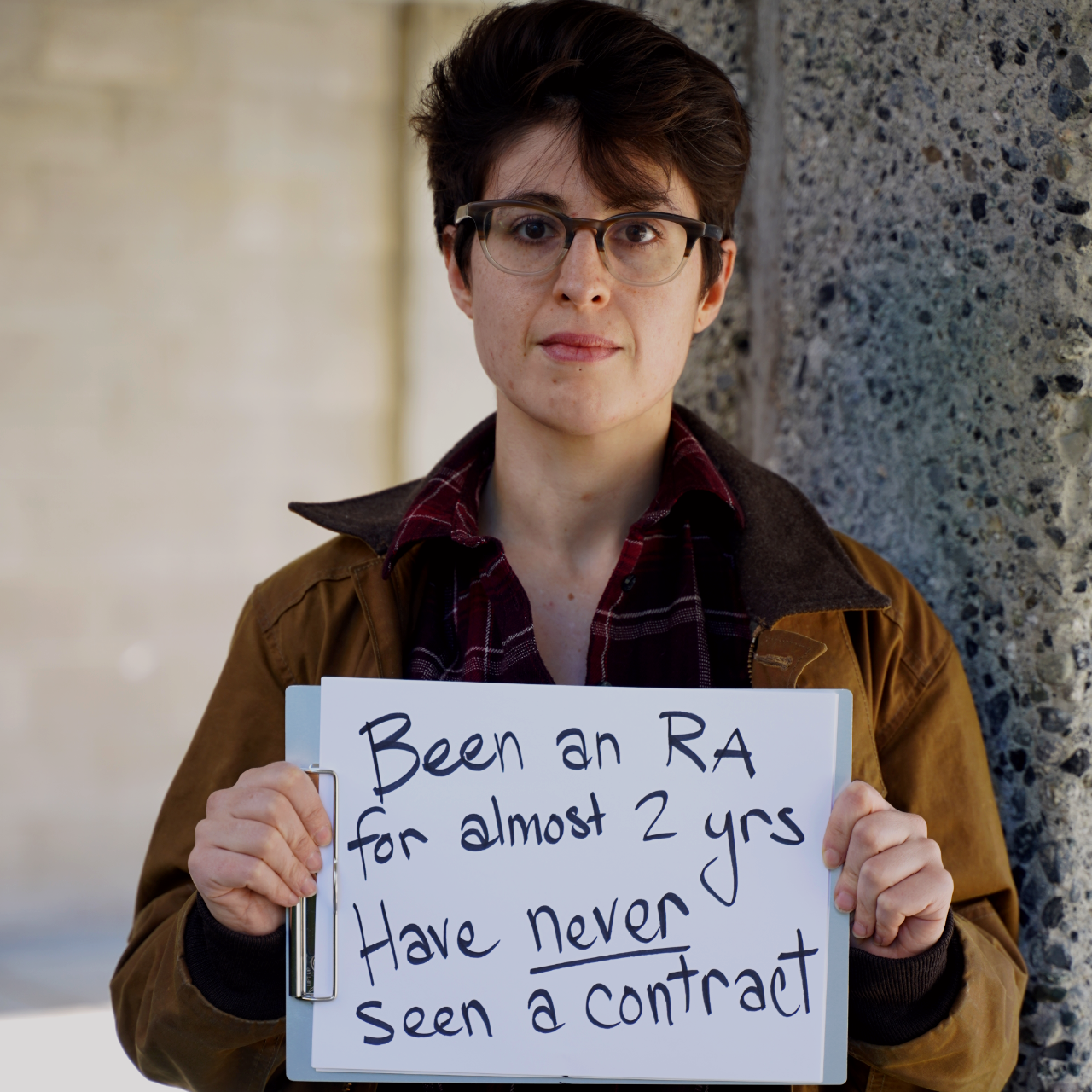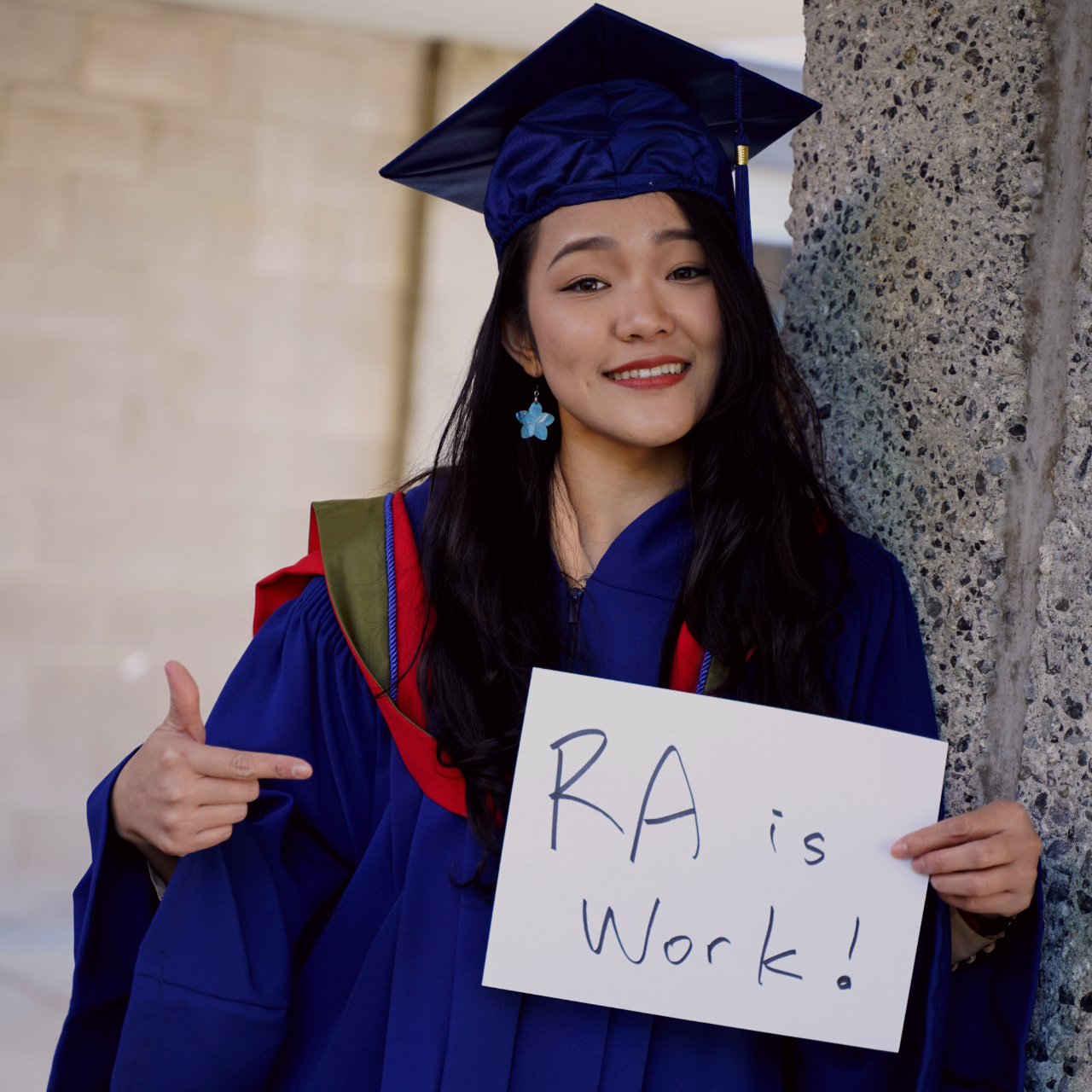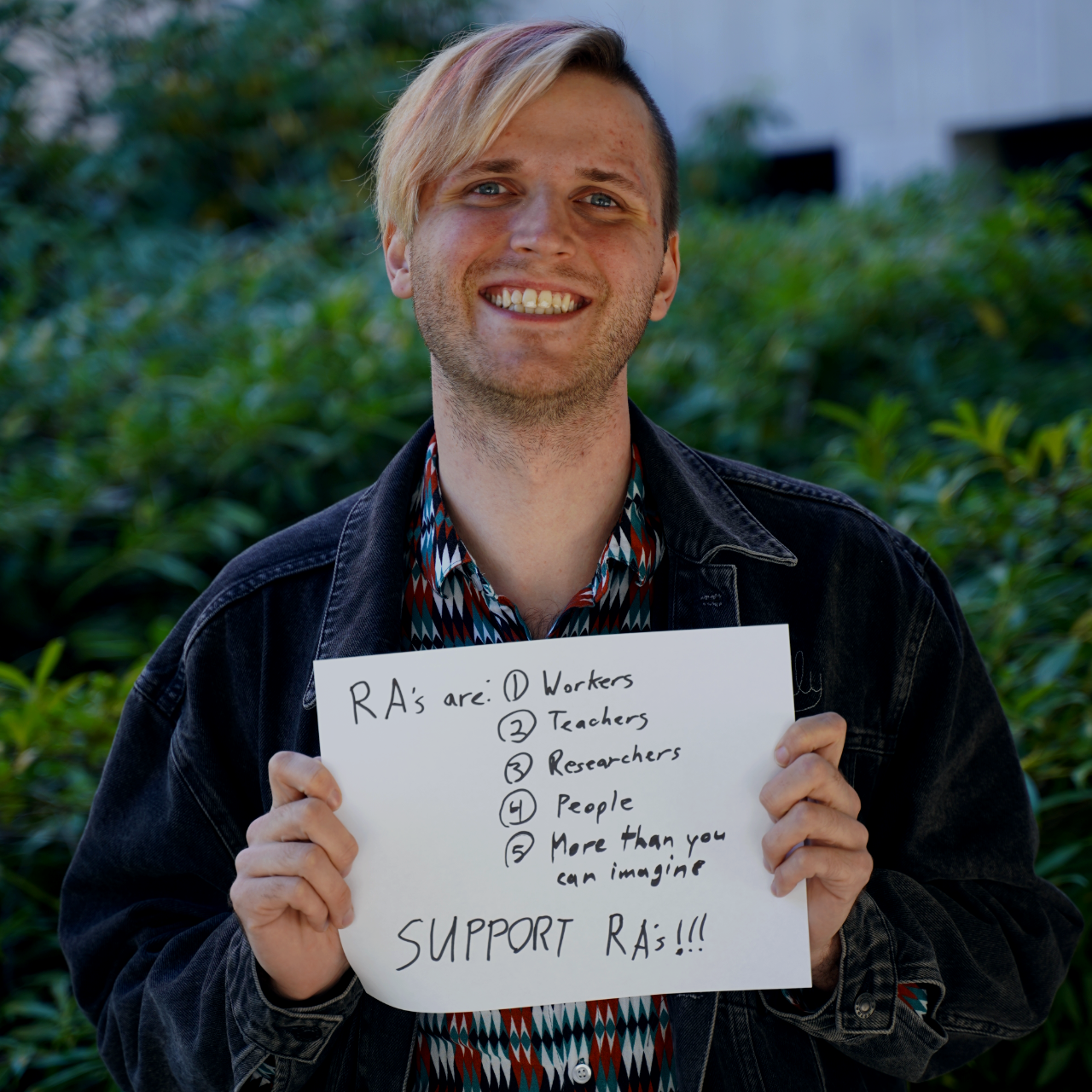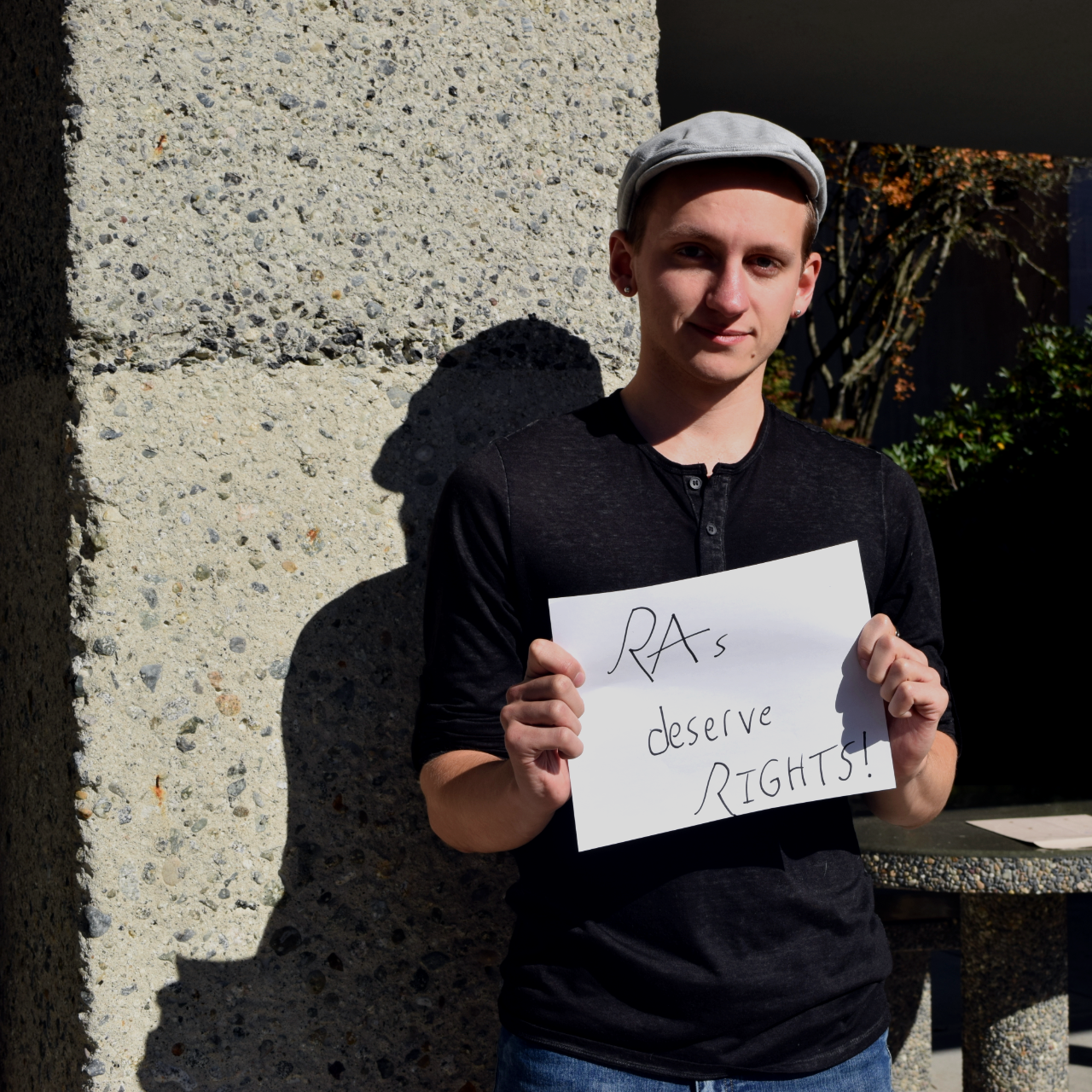Table of Contents
1. Collective Agreement
2. Advocacy
3. Benefits
4. Security & Solidarity
5. International Students
6. Faculty & Supervisors
7. TSSU Past Wins
1. Collective Agreement
What is a Collective Agreement?
It’s nice to have people in the union that can help you or a collective agreement to consult. Why is everything about being an RA so opaque? An RAship is like a blackbox.
A collective agreement (CA) is a binding legal contract between employers and unionized employees. The Union acts on behalf of all of its members in the bargaining unit, and the CA covers the terms and conditions of employment. A CA makes up the rules governing our relationship with the employer. TSSU’s current Collective Agreement can be found here.
While TAs, Professors, and Sessional Instructors–among other SFU workers–enjoy clearly defined terms of work from their CA, RAs are all too frequently left in the dark. RA work at SFU is murky, and when we talk to our fellow RAs confusion and exasperation are frequently noted. We hear that RAs don’t know what is expected of them, what their hours should be, and even if they’ll be paid on time. This opacity has led to consistent problems, misunderstandings, and mistreatment. RAs should have a right to negotiate for legally-binding contracts that clearly outline their duties and expectations, those of their managers (supervisors) and the employer (SFU).
2. Advocacy
The right to advocacy
As part of a union, you don’t need to go it alone when the employer violates the law or terms of work. Unions have trained representatives to advocate on your behalf!
As individual workers, we have very little power to advocate for ourselves at our jobs. Employers can ignore, reprimand, or even fire us for speaking out. Unionization allows workers to fight for respect, fairness, and dignity in our workplaces without fear of unjust persecution or dismissal by employers. How do unions do this? Union advocacy means, in part, having knowledgeable representatives there to support you. Our representatives help to ensure that rules are followed fairly and consistently across departments–that they employer is following the law and collective agreement. Union staff work to represent you in any labour situation should you want or need them.
3. Benefits
Tuition deferment means less stress–in particular, for international students. Without tuition deferment, I wouldn’t be able to buy a plane ticket back home at the beginning of the semester, when prices are lower, and pay tuition at the same time. SFU doesn’t take care of international students but the benefits from unionized TA work make being an international graduate student easier.
SFU is under no obligation to provide RAs benefits–certainly not in any way comparable to unionized TAs, Sessional Instructors, and Tutor Markers. Most RAships at SFU are grant funded, and the University has policies in place (R50) that prevent most grants from being used to fund benefits. On the other hand, unionized workers do better than their non-unionized counterparts. According to Statistics Canada, unionized workers in Canada have higher wages, access to benefits, and female-identifying workers are more likely to receive equal pay for equal work. RA unions across Canada have won intellectual property rights, paid professional development, pay raises, health and dental plans, and much more. TSSU members, in particular, have won employer-paid MSP premiums, tuition deferment, extended health and dental coverage, sick and compassionate leave, as well as seniority rights (see our TSSU Past Wins for more info).
4. Security & Solidarity
On August 20th, I got the news that the funding I was relying on to pay my tuition in the Fall would no longer be coming my way. This meant that if I was not able to secure a student loan in 3 weeks to cover my tuition, not only I would be out of school, I would also be unemployed.I didn’t realize how precarious I was until I could see the bottom falling out.
Universities are competing in a race to the bottom. Departments rely on low-wage sessional instructors to teach their courses–workers that must reapply for their jobs every semester. Teaching assistants and tutor markers are pushed to the brink of exhaustion for poverty wages. Something similar is true for researchers. Many of SFU’s RAs don’t have work, or paychecks, guaranteed for any length of time. Contracts are often renewed at the last minute, and workers are often unpaid until the last minute, which causes major strain for RAs financially, mentally and academically. If you’re one of the lucky RAs at SFU who’s found a good contract, unionizing will ensure it stays that way. Yet it’s unfair and disturbing the massive disparity in working conditions between labs and departments. Many RAs have stories of substandard and outright dangerous working conditions which they have had little to no power to resolve. RAs are often paid sporadically or not for months at a time. Others have struggled with overwhelming workloads, abusive managers, and toxic work environments–issues resolvable through TSSU via formal grievances or Union support.
If your current contract is good? Unionizing will ensure it stays that way. Should there be changes within your department, lab, or your own life (personal or academic) — your rights, job, and benefits will be protected. You have nothing to lose but your precarity.
As members of a union we gain collective power to pressure the university and support you. The connections we as individual members collectively bring that creates an extended support network. You’re tapping into the work experience, life experience, and knowledge of a large group of people who you otherwise wouldn’t have access to. A group of people with a common message to go the University, the Government and the general public to politically advocate for you (from workplace issues to issues of departmental funding).
5. International Students
“International students are profitable for the university, but also disposable”
Massive tuition hikes and the recent return of MSP premiums illustrates just how Simon Fraser sees international students: as a source of funding. International students are profitable for the university, but also disposable – they might return to their nation of origin, by choice or by force; they might not participate in the local academic community as much as domestic students; and perhaps most likely, they might simply run out of money. A union’s collective bargaining power allows it to advocate for greater protections for international students in a variety of contexts, and mobilize a whole field of workers in solidarity when necessary.
6. Faculty & Supervisors
More than 90% [of faculty surveyed] did not believe graduate student collective bargaining inhibited their own ability to advise or instruct their graduate students, and 88% felt that collective bargaining did not negatively impact the mentoring relationships between them and their graduate students.
Rogers, Eaton, and Voos (2014)
SFU’s R50 policy currently requires grant holders to take on the responsibility of “the Employer” when supervising Research Assistants. This has had an unfortunate result of complicating the supervisory relationship by recasting academics in the role of employer and foisting upon them a host of additional obligations, including potential liability when a health and safety incident occurs. These academics are often required to resolve employment grievances, discuss workplace standards, coordinate wages, and handle a variety of other work-related issues–which can distract from their projects. This unnecessary dynamic frequently has the effect of harming supervisory relationships. RA unionization would make SFU Administration the Employer of RAs, transferring liability and responsibility upwards and allowing RAs and supervisors to focus on research.
When graduate student unionization, including RA unionization, is studied, the results overwhelmingly indicate mutually beneficial outcomes for both Supervisors and RAs. For RAs, benefits include increased job stability, enhanced levels of personal and professional support, and greater clarity regarding their position. Faculty similarly report appreciating the simplicity that comes from RA unionization, identifying a subsequently enhanced supervisory connection. Several theories exist to explain this outcome. Gross (2006) argues that graduate employee unions “strengthen the relationship between students and faculty advisors by pushing potential employment-related conflicts up to the university bureaucracy.” It could also be, as Rogers, Eaton, and Voos (2014) note, that “graduate-student employee unions, either directly or through creating pressures that encourage management to rationalize practices, encourage stronger mentoring by faculty advisors.” These findings have also been identified by the court system in the United States, where a 1999 National Labour Relations Board ruling found no evidence of harm to the supervisory relationship where the unionization of graduate student workers had occurred at public universities (Boston Medical Center, 330 NLRB30 1999).
Unionization holds clear benefits for Research Assistants and Supervisors, by focusing their relationship on research. As RAs at SFU, we deeply value the bonds we forge with our advisors. We wish to simplify that relationship and gain the added benefits that come to graduate-student employees through unionization. We ask for your support in this project.
Access to collective bargaining has historically raised wages and benefits for workers who unionize. Currently, many of us work second, third, or even fourth jobs to cover their expenses; each additional position decreases their time at SFU, and their ability to stay connected to the research. Not only does this have dramatic effects on our lives, it degrades the quality of research. Part of the financial drain on our salaries comes from SFU tuition and fees. Faculty grants fund our compensation, but then they are immediately redirected to the university through fee collection. Unionization would allow RAs to negotiate with the university for tuition reduction, which would not only improve our quality of life, but would also ease the pressure on faculty research grants. Unionization leads to better research, not only because a wider range of researchers will be attracted to the increased compensation, but also because regular employment would allow existing researchers to scale back off-campus work.
7. TSSU Past Wins
Knowing what the union could offer against un-unionized working conditions was a big reason that I became involved with TSSU. When I did, I found a home. I participated in union meetings, and had my voice heard in important discussions over wages and working conditions. Because of my suggestions, the union even changed the way one of its committees worked! I am TSSU.
Certified in 1978, the Teaching Support Staff Union has amassed an impressive set of victories, resulting in considerable benefits for all our members.These gains were only possible, and are only available to us today, through the collective action of TSSU members.
In 1985, TSSU took the BC Provincial Government to court–to ensure that international students would be eligible for public health care in BC–and won.
In 1998, TSSU demanded that SFU pay for workers’ healthcare premiums. Since then, SFU has paid for 100% of TSSU members’ MSP costs.
In 2001, TSSU won the right to tuition deferment for its members–a system where we can pay tuition bit-by-bit over the course of the semester with no late fees or penalties.
In 2014, SFU mandated exploitative, high-cost healthcare for international students during the 3-month waiting period prior to receiving provincial health care. Some of the worst aspects included automatic re-enrolment, an overlapping period of services with legally required MSP coverage, and a 5% kickback to SFU for every fee collected from students. TSSU filed a grievance against SFU and the new plan, winning $120,000 for affected students, a price cut, and ongoing refunds.
TSSU has a history of significant victories for workers at SFU. It’s time that RAs can also say “I am TSSU,” and fight for fairness, dignity, and respect–a better life for RAs!




